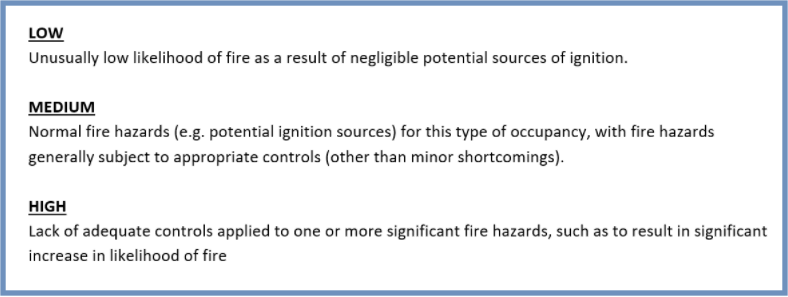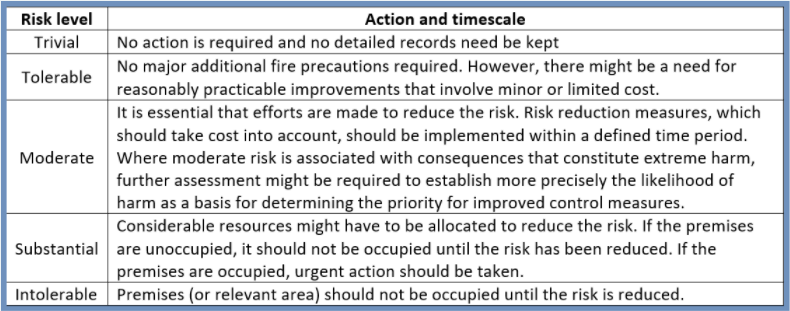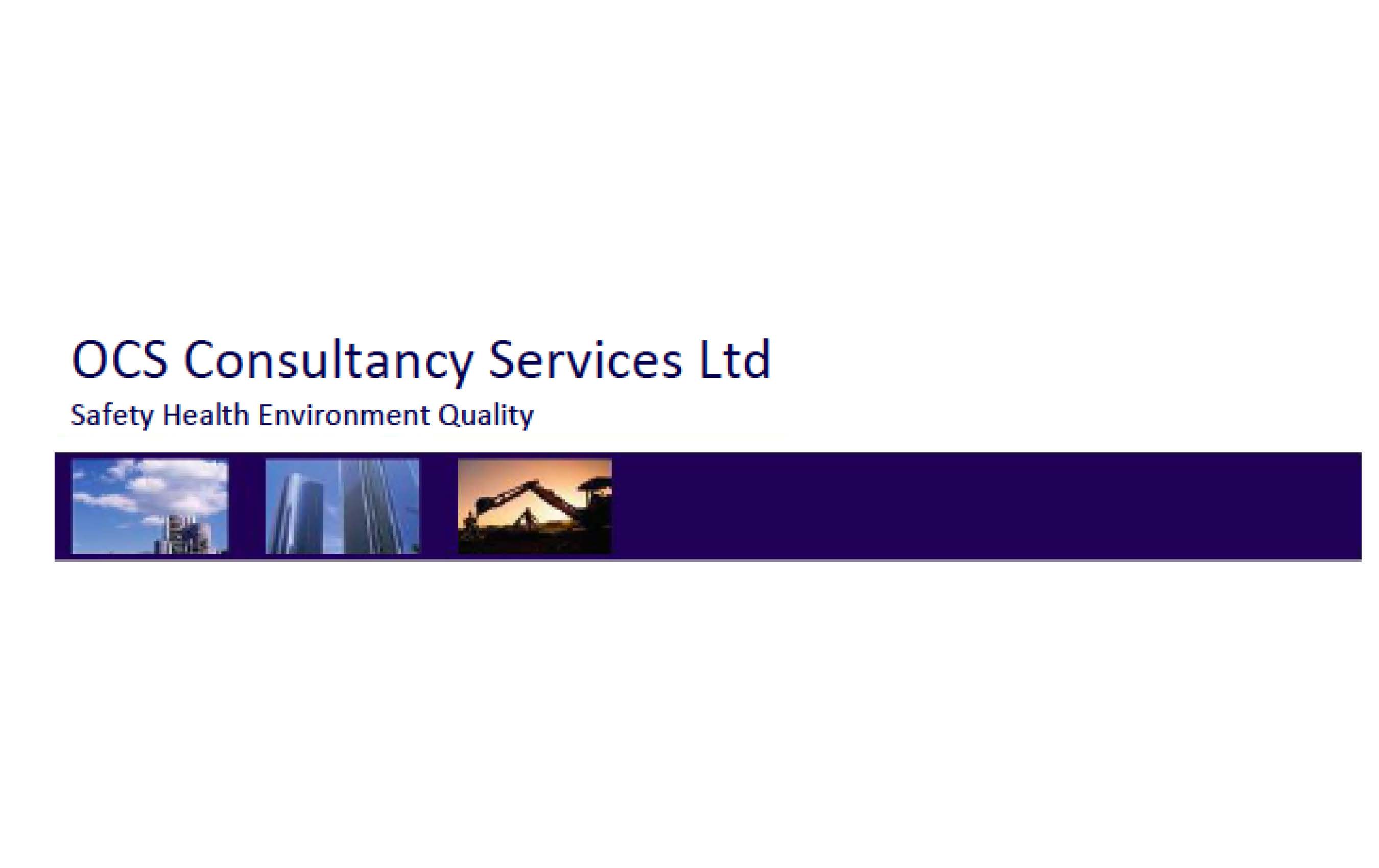Title Page
-
Site conducted
-
Property Owner/ Landlord
-
Address of Property
-
Current Occupiers
-
Responsible Person or Person Having Control of Premises
-
Date of Previous Fire Risk Assessment
-
Suggested Date for Review
-
Prepared by
-
Supported by
-
Assessors Signature
-
Date of Assessment
Information
GENERAL INFORMATION
-
1.00 - The Premises
-
1.01 - Number of floors and basements
-
1.02 - Approximate floor area
-
1.03 - Brief details about the construction
-
1.04 - Use of the premises
-
2.00 - The Occupants
-
2.01 - Approximate maximum number of persons
-
2.02 - Maximum number of occupants at any one time
-
2.03 - Maximum number of public at any one time
-
2.04 - Associated times/hours of occupation
-
3.00 - Occupants at Special Risk
-
3.01 - Number of Sleeping Occupants
-
3.02 - Number of Disabled Occupants
-
3.03 - Number of Occupants in remote areas or lone workers
-
3.04 - Number of Young Persons
-
3.05 - Others
-
4.00 - Fire Loss Experience
-
4.01 - Number of Fires in the past 10 years
-
5.00 - Other Relevant Information
-
5.01 - Details
Fire Hazards
HAZARD AND RISK FACTORS
-
What are the factors present in the inspected area? You may choose multiple items. *You may also add photos, notes, and actions by clicking the paperclip icon.
- Electrical Sources of Ignition
- Smoking
- Arson
- Portable Heaters and Heating Installations
- Kitchen
- Lightning
- Other Significant Ignition Sources
- Housekeeping
- Outside Contractor and Building Work Hazards
- Dangerous Substances
Smoking
-
Reasonable measures taken to prevent fires as a result of smoking?
-
Is smoking prohibited in premises?
-
Is smoking prohibited in appropriate areas of premises?
-
Are suitable arrangements in place for those who wish to smoke?
-
Does the no smoking policy appear to be observed at time of inspection?
-
Are there more details observed?
Observation
-
Detail of observation
Kitchen
-
Are reasonable measures taken to prevent fires as a result of cooking?
-
Are filters changed and ductwork cleaned regularly?
-
Are suitable extinguishing appliances available?
-
Are there more details observed?
Observation
-
Details of observation
Electrical Sources of Ignition
-
Reasonable measures taken to prevent fires of electrical origin?
-
Fixed installation periodically inspected and tested?
-
Portable appliance testing (where appropriate) carried out?
-
Suitable policy regarding the use of personal electrical appliances?
-
Suitable limitation of electrical extension leads or multi point adaptors?
-
Are there more details observed?
Observation
-
Detail of observation
Portable Heaters and Heating Installations
-
Is the use of portable heaters avoided as far as is practicable?
-
Is the use of the more hazardous type of portable heaters (radiant bars or LPG) avoided?
-
Are suitable measures taken to minimize the hazard of ignition of combustible materials?
-
Are fixed heating installations subject to regular maintenance?
-
Are there more details observed?
Observation
-
Details of observation
Lightning
-
Does the building have a lightning protection system?
Observation
-
Detail of observation
Other Significant Ignition Sources
-
Is there avoidance of other significant ignition sources?
-
Is there avoidance of activity involving processes such as frictional heat?
-
Is there avoidance of light bulbs or heating appliances near flammable/combustible materials?
-
Are there more details observed?
Observation
-
Detail of observation
Arson
-
Does basic security against arson by outsiders appear reasonable?
-
Are there fire loads in close proximity from the premises?
-
Are there more details observed?
Observation
-
Detail of observation
-
List Observations
Housekeeping
-
Is the standard of housekeeping adequate?
-
Are combustible materials separated from ignition sources?
-
Is there an avoidance of unnecessary accumulation of combustible materials or waste?
-
Is there appropriate storage of combustible materials?
-
Is there avoidance of inappropriate storage of combustibles materials?
-
Are all textiles and furniture treated to be fire retardant?
-
Are substantial areas of walls or ceilings covered with flammable linings or materials avoided?
-
Are there more details observed?
Observation
-
Details of observation
Dangerous Substances
-
Have the hazardous properties of dangerous substances been considered?
-
Is there adequate information on safety provided by the supplier on any relevant safety data sheet?
Has account been taken regarding:
-
the special, technical and organisational measures and the substances used and their possible interactions.
-
the amount of the substance involved
-
where the work will involve more than one dangerous substance, the risk presented by such substances in combination
-
the arrangements for the safe handling, storage and transport of dangerous substances and of waste containing dangerous substances
-
any other measures introduced as a result of the Regulatory Reform (Fire Safety) Order 2005 / Fire Safety Regulations (Northern Ireland) 2010 / Fire (Scotland) Act 2005
-
Are there safe systems of work for maintenance, where there is the potential for a high level of risk?
-
Are sufficient control measures in place to counter the likelihood that an explosive atmosphere will occur and its persistence including adjacent areas?
-
Are sufficient control measures in place to counter the likelihood that ignition sources, including electrostatic discharges, will be present and become active and effective
-
Has account been taken regarding the scale of the anticipated effects?
-
Is sufficient additional safety information available to enable the assessment to be completed?
-
Has account been taken regarding sources of oxygen?
-
Is there no piped oxygen systems in use?
-
Are there avoidance of oxygen cylinders used or stored?
-
Is there an operational procedure for isolation?
-
Are oxidising materials safely used or stored?
-
Has a specific risk assessment been carried out, as required by the Dangerous Substances and Explosive Atmospheres Regulations 2002?
-
Is there an absence of other significant hazards that warrant consideration including process hazards that impact on general fire precautions?
-
Are there more details observed?
Observation
-
Details of observation
Outside Contractor and Building Work Hazards
-
Are fire safety conditions imposed on outside contractors?
-
Is there satisfactory control over works carried out in the building by outside contractors (including hot work permits)?
-
If there are in-house maintenance personnel, are suitable precautions taken during hot work, including use of hot work permits?
-
Are there more details observed?
Observation
-
Details of observation
Fire Protection
FIRE PROTECTION MEASURES
-
Escape Route Distances B1
-
Escape Route Sizes B1
-
1. Means of Escape from Fire
-
It is considered that the premises are provided with reasonable means of escape in case of fire
-
Is there adequate design of escape routes?
-
Is there adequate provision of escape exits?
-
Are exits easily and immediately openable where necessary?
-
Do fire exits open in direction of escape where necessary?
-
Are sliding or revolving doors avoided as fire exits where necessary?
-
Are there satisfactory means for securing exits?
-
Are single direction travel distances reasonable in the circumstances of the case?
-
Are alternative means of escape travel distances reasonable in the circumstances of the case?
-
Are suitable fire precautions provided for inner and inner-inner rooms?
-
Are escape routes unobstructed?
-
Is the premises provided with reasonable arrangements for means of escape for disabled people?
-
Are the exits in the right place and do the escape routes lead as directly as possible to a place of total safety?
-
Are the people who work in the building aware of the importance of maintaining the safety of the escape routes by ensuring that fire doors are not wedged or held open?
-
Are fire doors free from holes or damage?
-
Are fire doors provided with appropriate fire doors signs?
-
Are all external escape routes unobstructed and providing a clear route to the fire assembly points?
-
Is there avoidance of holes or gaps in walls, ceilings and floors properly sealed, e.g. where services such as ventilation ducts and electrical cables pass through them?
-
Can all the occupants escape to a place of total safety in a reasonable time?
-
Are fire assembly points in safe locations?
-
Is fire door integrity/strips/seals and all door furniture adequately maintained?
-
Are fire action notices adequate?
-
If vertical evacuation is necessary (internal or external), are stairways suitable in size and width?
-
Are there more details observed?
Observation
-
Details of observation
-
2. Fire Spread and Development Limitation
-
Is it considered that there is compartmentation of a reasonable standard?
-
Is it considered that there is reasonable limitation of linings that may promote fire spread?
-
Is there avoidance of any external combustible materials such as cladding or balconies?
-
Are sprinklers if provided of the correct type for the risks present?
-
Are fire/smoke dampers and control systems maintained and tested?
-
Are there more details observed?
Observation
-
Details of observation
-
3. Escape Lighting
-
Are all your escape routes covered by an acceptable form of emergency lighting?
-
Are toilets, plants rooms, external fire escape staircases, underground car parks and external escape routes covered by an acceptable form of emergency lighting?
-
Is there back-up power supplies for the emergency lighting?
-
Are there more details observed?
Observation
-
Details of observation
-
4. Fire Safety Signs and Notices
-
Where necessary are escape routes and exits, the locations of fire fighting equipment and emergency telephones indicated by appropriate signs?
-
Where necessary are notices provided such as those giving information on how to operate security devices on exit doors, those indicating doors enclosing fire hazards that must be kept shut and fire action notices for staff and other people?
-
Are you maintaining all the necessary signs and notices so that they continue to be correct, legible and understood?
-
Are you maintaining signs that you have provided for the information of the fire and rescue service, such as those indicating the location of water suppression stop valves and the storage of hazardous substances?
-
Are there more details observed?
Observation
-
Details of observation
-
5. Fire Warning Arrangements
-
Is a reasonable manually operated electrical fire alarm system provided?
-
Are fire alarm call points located at all final exits, storey exits, fire compartment wall exits or exits from rooms of high risk?
-
Is the fire control panel located at an exit and visible to the emergency services from the outside of the building?
-
Can the existing means of detection ensure a fire is discovered quickly enough for the alarm to be raised in time for all the occupants to escape to a place of total safety?
-
Are the automatic fire detectors of the right type and in the appropriate locations?
-
Can the means of warning be clearly heard or be perceptible and understood by everyone throughout the whole building when initiated from a single point?
-
Are there provisions for people in locations where the alarm cannot be heard?
-
If the fire-detection and warning system is electrically powered, does it have a back-up power supply?
-
Is there a remote transmission of alarm signal provided where applicable?
-
Are anti-tamper devices fitted to fire alarm call points in post 2016 fitted systems.
-
Is a zone plan of the fire alarm system provided adjacent to the main control panel in newer installations?
-
Are there more details observed?
Observation
-
Details of observation
-
6. Portable Fire Extinguishing Appliances
-
Are the extinguishers suitable for the purpose?
-
Are there enough extinguishers sited throughout the premises at appropriate locations?
-
Are the right types of extinguishers located close to the fire hazards and can users get to them without exposing themselves to risk?
-
Is there avoidance of extinguishers hidden from view so that their position need indicating?
-
Have steps been taken to prevent the misuse of extinguishers where appropriate?
-
Are fire fighting appliances checked that they are in good order at least monthly by the occupier?
-
Are those who test and maintain the fire fighting equipment competent to do so?
-
Are hose reels provided where required and suitably maintained?
-
Are there more details observed?
Observation
-
Details of observation
-
7. Automatic Fixed Systems
-
Is there a suitable sprinkler or water based systems provided where required for the risk present?
-
Is there a suitable gaseous local application or total flooding systems provided where required for the risk?
-
Are those who test and maintain the fixed fire fighting systems competent to do so?
-
Are there more details observed?
Observation
-
Details of observation
-
8. Other Fixed Systems
-
Are there suitable smoke control facilities provided where required for the risk present?
-
Are those who test and maintain the smoke control facilities competent to do so?
-
Are there more details observed?
Observation
-
Details of observation
Managing Fire Safety
MANAGING FIRE SAFETY
-
1. Procedures and Arrangements
-
Appropriate fire procedures in place and properly documented?
-
Are staff aware of the emergency plan, including the identity of people nominated to do a particular fire duty task?
-
Have visitors and guests been informed about what to do in an emergency?
-
Have staff been given information about any dangerous substances?
-
Do you have arrangements for informing temporary or agency staff?
-
Is there an arrangement for informing other employers whose staff are in the premises, such as other employers, maintenance contractors and cleaners?
-
Have fire safety arrangements been co-ordinated with other responsible people and with any companies in the building?
-
Have details been recorded of any information or instructions you have given and the details of any arrangements for co-operation and co-ordination with others?
-
Have sufficient fire wardens been appointed to help in evacuating the premises?
-
Are there suitable arrangements for summoning the fire and rescue service?
-
Are there suitable arrangements to meet the fire and rescue service on arrival and provide them with relevant information?
-
Are there suitable arrangements for ensuring that the premises have been evacuated?
-
Is there a suitable fire assembly point(s)?
-
Are there adequate procedures for evacuation of any disabled people who are likely to be present?
-
Are persons nominated and trained to use fire extinguishing appliances?
-
Have the fire and rescue service carried out pre-fire inspections of the premises?
-
Has an emergency pack been provided for fire and rescue service information during an incident?
-
Are routine fire inspections carried out?
-
Are there more details observed?
Observation
-
Details of observation
-
2. Training and drills
-
Are all staff given adequate fire safety instruction and training on induction?
-
Are all staff given periodic refresher fire training at suitable intervals?
-
Are regular fire drills carried out at appropriate intervals?
-
Does all staff training provide information, instruction or training on the following?
-
Fire risks in the premises?
-
The fire safety measures on the premises?
-
Action in case of fire?
-
Action on hearing the fire alarm signal?
-
Method of operation of fire alarm call points?
-
Location and use of fire extinguishers?
-
Means for summoning the fire and rescue service?
-
Identity of persons nominated to assist with evacuation?
-
Identity of persons nominated to use fire extinguishing appliances?
-
Are fire wardens given additional training?
-
Are joint training and fire drills sessions carried out in multi-occupied buildings?
-
Are employers aware of fire risks and general fire precautions for other organisations in the premises?
-
Are employees provided with adequate instructions and information regarding fire risks and general fire precautions for other organisations in the premises?
-
Have staff working in areas for used or store hazardous or explosive substances had appropriate fire training?
-
Are there more details observed?
Observation
-
Details of observation
-
3. Testing and Maintenance
-
Adequate maintenance of workplace?
-
Weekly testing and periodic servicing of fire detection and alarm system?
-
Monthly and annual testing routines for emergency lighting?
-
Annual maintenance of fire extinguishing appliances?
-
Are weekly testing and periodic inspection of sprinkler installations where provided?
-
Are weekly and monthly testing, six monthly inspection and annual testing of fire-fighting lifts required where provided?
-
Are periodic inspection of external escape staircase and gangways where provided?
-
Routine checks of final exit doors and security fastenings?
-
Is an annual inspection of lightning protection system required where provided?
-
Are six-monthly inspection and annual testing of private hydrants required where provided?
-
Are other relevant inspections or tests where required?
-
Are daily checks required to ensure that there is clear access for fire engines where required?
-
Are suitable systems in place for reporting and subsequent restoration of fire safety measures that have failed?
-
Are there more details observed?
Observation
-
Details of observation
-
4. Records
-
Are appropriate records kept for fire training and fire evacuation drills?
-
Are appropriate records kept for fire alarm tests?
-
Are appropriate records kept for escape lighting tests?
-
Are appropriate records kept for the maintenance and testing of other fire protection systems?
-
Are your fire records immediately available for inspection by the enforcing authority?
-
Is there an emergency plan in place?
-
Does the fire emergency plan take account of other emergency plans applicable in the building?
-
Is the fire emergency plan readily available for staff to read?
-
Is the fire emergency plan available to the enforcing authority?
-
Are Personal Emergency Evacuation Plans (PEEPS) required and in place?
-
Are there more details observed?
Observation
-
Details of observation
Overall Assessment
-
The following simple fire risk level estimator is based on a commonly used health and safety risk level estimator.
-
-
DEFINITION OF TERMS (Risk from Fire)
-
-
Taking into account the fire prevention measures observed at the time of this risk assessment, it is considered that the risk from fire (likelihood of fire) at these premises is:
-
DEFINITION OF TERMS (Risk Assessment)
-
-
Taking into account the nature of the premises and the occupants, as well as the fire protection and procedural arrangements observed at the time of this fire risk assessment, it is considered that the consequences for life safety in the event of fire would be:
-
DEFINITION OF TERMS (Risk Level)
-
-
Accordingly, it is considered that the risk to life from fire at these premises is:
COMPLETION
-
Name of Responsible Person and Signature
-
Assessor's Name and Signature























